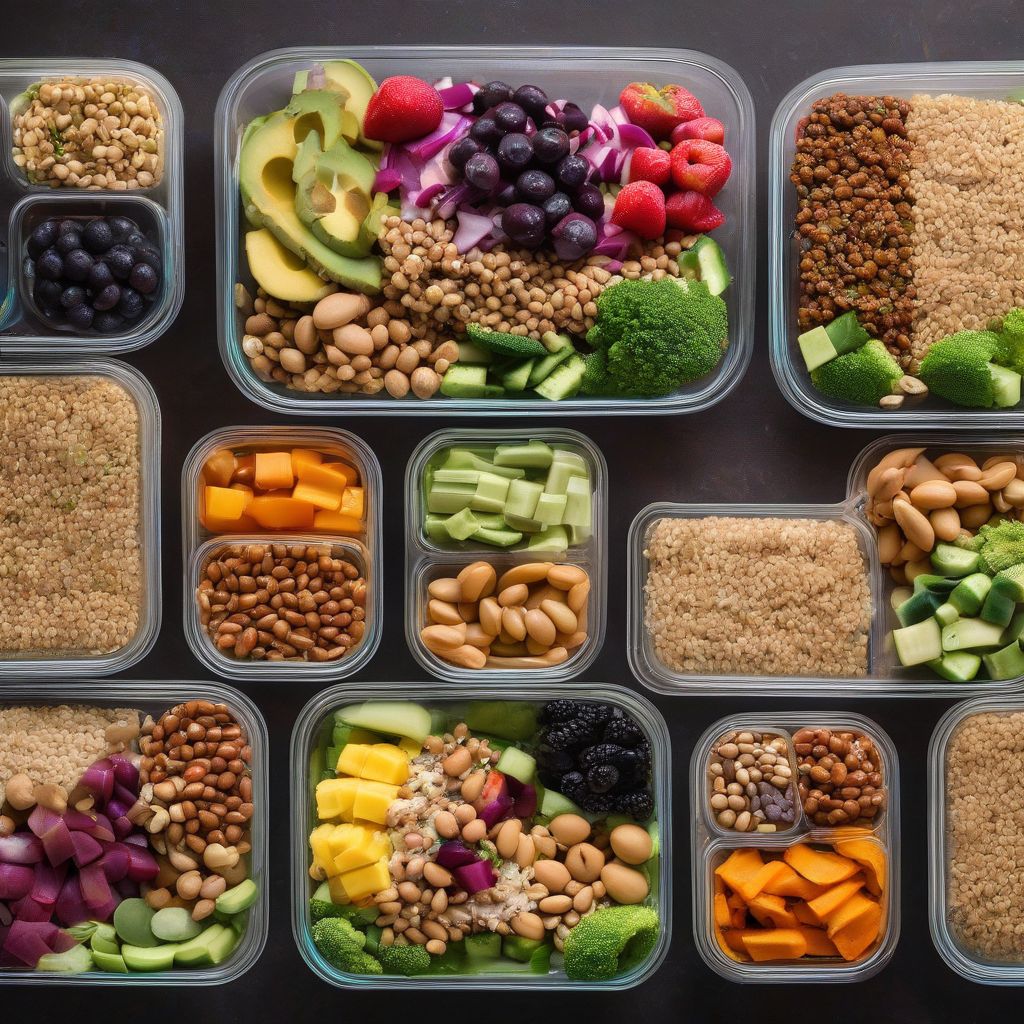Have you ever dreamt of feeling lighter, more energized, and vibrantly healthy? A well-planned plant-based diet could be your ticket to this dream! More and more people are discovering the incredible benefits of embracing a lifestyle centered around fruits, vegetables, legumes, and whole grains. But as with any dietary shift, it’s crucial to have the right information to thrive. That’s why I’m here to share essential nutritional tips to help you flourish on your plant-based journey. Let’s dive in!
Understanding the Basics of a Plant-Based Diet
Before we jump into the nitty-gritty of nutrients, let’s clarify what constitutes a plant-based diet. In a nutshell, it prioritizes foods from plant sources, including:
- Fruits and Vegetables: Aim for a colorful plate bursting with antioxidants and fiber.
- Legumes: Lentils, chickpeas, beans – these are your protein powerhouses!
- Whole Grains: Opt for quinoa, brown rice, oats, and whole-wheat bread over refined grains.
- Nuts and Seeds: Nutrient-dense snacks packed with healthy fats, protein, and fiber.
While some individuals choose to eliminate all animal products, a plant-based diet doesn’t have to be restrictive. It’s about focusing on plant foods while making conscious choices that align with your health goals.
Key Nutrients to Prioritize
Now, let’s talk about those essential nutrients that often top the charts in conversations about plant-based eating:
1. Protein: The Building Block of Life
“Where do you get your protein?” – a common question directed at those following a plant-based lifestyle. Rest assured, plant-based protein sources are abundant!
Here’s the thing:
- Legumes: Lentils, chickpeas, black beans, and kidney beans are all excellent sources of protein.
- Tofu, Tempeh, and Edamame: These soy-based products are complete protein sources, meaning they contain all nine essential amino acids.
- Nuts and Seeds: Snack on almonds, walnuts, chia seeds, or sunflower seeds for a protein boost.
- Quinoa: This ancient grain stands out as a complete protein source.
Expert Tip: Combining different plant-based protein sources throughout the day ensures you’re getting all the essential amino acids your body needs.
2. Iron: For Energy and Vitality
Iron plays a vital role in transporting oxygen throughout your body, making it essential for energy levels and overall well-being.
Focus on these iron-rich plant sources:
- Lentils: A true nutritional powerhouse, lentils are packed with iron.
- Spinach and other Leafy Greens: Don’t underestimate the power of a simple salad!
- Tofu: Another reason to add this versatile ingredient to your grocery list.
- Fortified Cereals: Choose fortified breakfast cereals to boost your iron intake.
Expert Tip: Pair iron-rich plant foods with a source of vitamin C (like citrus fruits, bell peppers, or strawberries) to enhance iron absorption.
3. Vitamin B12: The Brain and Nerve Nutrient
Vitamin B12 is primarily found in animal products, making it a nutrient to be mindful of on a plant-based diet.
Here’s the solution:
- Fortified Foods: Opt for fortified plant milk, nutritional yeast, or breakfast cereals.
- Supplements: Talk to your doctor or a registered dietitian about whether a B12 supplement is right for you.
Expert Tip: Regular blood work can help monitor your B12 levels, ensuring you’re meeting your needs.
4. Calcium: Strong Bones and Beyond
Calcium is well-known for its role in bone health, but it also plays a vital role in muscle function and nerve transmission.
Boost your calcium intake with these plant-based sources:
- Leafy Green Vegetables: Kale, collard greens, and bok choy are surprisingly good sources of calcium.
- Fortified Plant Milk: Many plant-based milk options are fortified with calcium.
- Tofu (Calcium-Set): Check the label to ensure the tofu has been set with calcium sulfate.
- Almonds: A handful of almonds provides a dose of calcium along with healthy fats.
Expert Tip: Adequate vitamin D levels are crucial for calcium absorption, so consider spending some time outdoors or talking to your doctor about a vitamin D supplement.
5. Omega-3 Fatty Acids: For Heart and Brain Health
Omega-3 fatty acids are essential fats that our bodies need for various functions, including heart health, brain function, and reducing inflammation.
Plant-based sources of omega-3s include:
- Flaxseeds: Grind flaxseeds to unlock their omega-3 content.
- Chia Seeds: These tiny seeds are a nutritional powerhouse, offering omega-3s, fiber, and protein.
- Walnuts: Enjoy a handful of walnuts as a snack or sprinkle them on salads.
- Algae Oil Supplements: Algae oil is a vegan source of DHA and EPA, two important types of omega-3s.
Expert Tip: Aim to include a variety of omega-3-rich foods in your diet regularly.
 Plant-Based Meal Prep
Plant-Based Meal Prep
Planning Your Plant-Based Plate: Practical Tips
Transitioning to a plant-based diet doesn’t have to be overwhelming. Here are some practical tips to help you thrive:
- Crowd Out with Plants: Instead of focusing on what to eliminate, focus on adding more plant foods to your plate.
- Read Labels: Familiarize yourself with food labels to make informed choices and check for added sugars, sodium, or unhealthy fats.
- Listen to Your Body: Pay attention to your hunger and fullness cues. Eating intuitively can help prevent overeating or feeling restricted.
- Experiment with Recipes: Plant-based cooking is incredibly versatile! Explore cookbooks, blogs, and websites for recipe inspiration.
- Seek Professional Guidance: Consulting with a registered dietitian can provide personalized guidance and ensure you’re meeting your nutritional needs.
Embracing the Plant-Powered Journey
Switching to a plant-based diet can be one of the best decisions you make for your health and the planet. Remember to focus on whole, unprocessed foods, prioritize nutrient-dense choices, and enjoy the delicious variety that plant-based eating has to offer. With a little planning and these essential tips, you’ll be well on your way to experiencing the incredible benefits of a plant-powered lifestyle!
Ready to take your plant-based meal planning to the next level? Check out our guide on How to Create Balanced Plant-Based Meals for delicious and easy meal ideas.
[amazon bestseller=”plant-based cookbook”]
